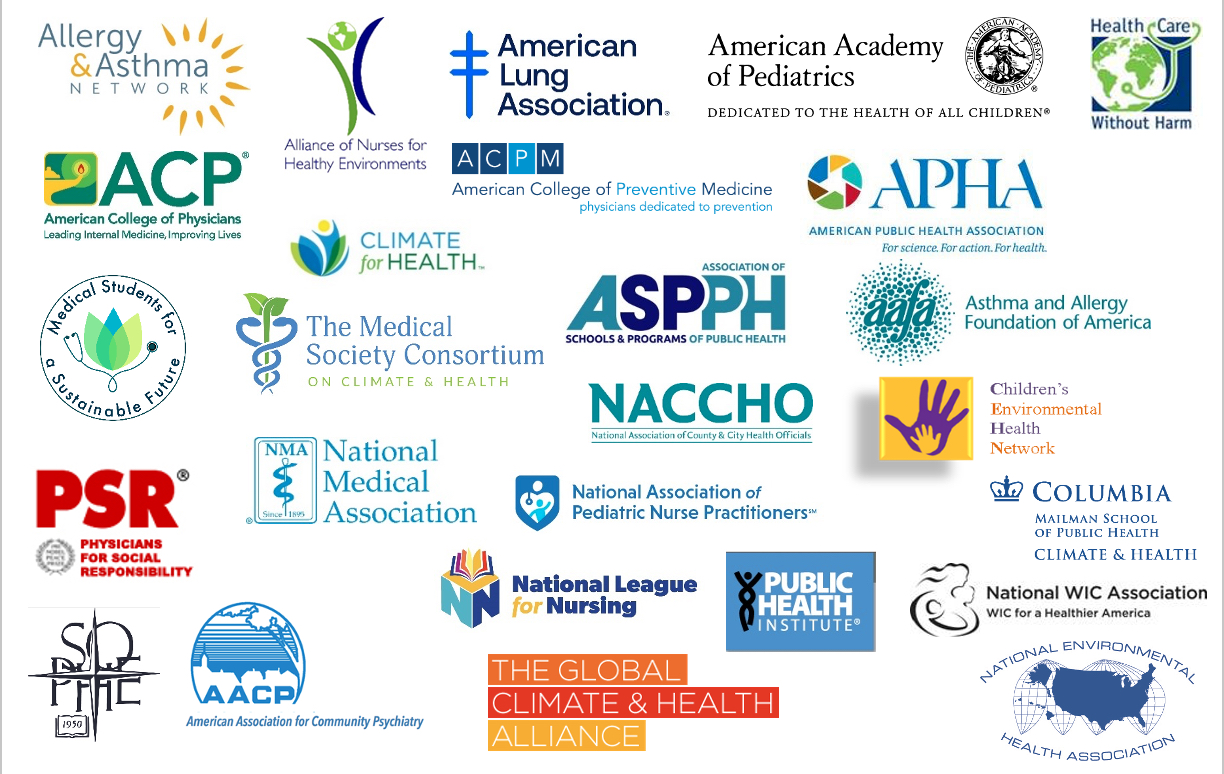January 26, 2021
As leading public health, environmental health, patient advocacy, healthcare, nursing and medical organizations, we declare climate change a health emergency and call for immediate action to protect the public’s health from the current and future impacts of climate change. Our organizations agree that:
- The health impacts of climate change demand immediate action.
- The science is clear; communities across the nation are experiencing health impacts due to changing climate conditions, including:
- Increased levels of ozone and particulate air pollution that contribute to asthma attacks, cardiovascular disease and premature death;
- Extreme weather patterns, such as heat and severe storms, that cause injury, increase physical and mental illness, and reduce access to healthcare;
- Wildfires and dangerous smoke that spreads for thousands of miles, aggravating heart and lung conditions;
- Increased risk of exposure to vector-borne diseases due to lengthening of warm seasons and expanding geographic ranges for vectors like ticks, mosquitoes and other disease-carrying insects;
- Increased risk of exposure to waterborne pathogens and algal toxins that can cause a variety of foodborne and waterborne illnesses; and
- Longer and more intense allergy seasons.
- Every American's health is already at risk from climate change, but the burden is not shared equally. Children, seniors, pregnant women, low-income communities, communities of color, people with disabilities, people who work outdoors and people with chronic disease disproportionately bear the health impacts of climate change and air pollution. As a result of numerous current and legacy racist policies and practices, people of color are disproportionately more likely to have multiple pre-existing health conditions, to face social disadvantages and environmental risks that make them more vulnerable to climate change.
- The economic and social systems that fuel climate change have also contributed to the health inequities that COVID-19 has exacerbated, revealing those systems’ inherent vulnerability. Relatedly, long-term air pollution exposure is linked to worse COVID-19 outcomes, including higher death rates.
- Addressing COVID-19 presents opportunities to simultaneously address climate change and advance public health by strengthening public health and health care infrastructure and reducing dangerous air pollution. It is imperative that efforts to build up our public health and health care infrastructure in the wake of COVID-19 incorporate climate action and climate justice, to avoid recreating the same vulnerabilities that have been laid bare by the pandemic.
Urgent action is needed to protect health from climate change and reduce air pollution at the same time. We urgently call for policies that:
- Adopt science-based targets to prevent climate warming above 1.5 C;
- Maximize benefits to health by reducing carbon and methane pollution while also reducing other dangerous emissions from polluting sources;
- Promote health equity by ensuring that pollution is cleaned up in all communities, prioritizing the elimination of polluting sources in communities that have historically borne a disproportionate burden from air, water and soil pollution; and
- Leave the Clean Air Act fully in place. Any policy to address climate change must not weaken or delay the Clean Air Act or the authority that it gives EPA to reduce carbon emissions.
Priority policies to drive equitable climate action and pollution cleanup include:
- Stronger, science-based National Ambient Air Quality Standards for ozone and particulate matter;
- Measures to transition to affordable cleaner and zero-emission cars, SUVs, light trucks and heavy-duty vehicles and fleets. This includes installation of publicly accessible vehicle-charging infrastructure in urban and rural areas, as well as for multi-unit housing;
- Measures to secure dramatic reductions in carbon emissions from power plants, including rapid phaseout of power plants that burn fossil fuels, biomass, and waste-for-energy.
- Strong limits on methane pollution from new and existing oil and gas operations, and on other short-lived climate pollutants including hydrofluorocarbons and anthropogenic black carbon; and
- Incentives and investments to make clean, non-combustion renewable energy accessible to all, including low-income residents and multi-unit housing.
Communities must also have the tools and resources to identify, prepare for and adapt to the unique health impacts of climate change in their communities.
- Public health, health care and environmental health systems must have adequate resources to protect communities by identifying, preparing for and responding to the health impacts of climate change and other public health emergencies, paying specific attention to the needs of vulnerable groups.
- Community leaders must be able to adequately protect those whose health is most at risk, and provide access to uninterrupted, quality healthcare during and after disasters. This requires coordinated action at the federal, state, and local levels.
- Opportunities that arise in the transition to a clean energy economy must uplift all communities, including those previously dependent on fossil fuel infrastructure and those affected by historical disinvestment.
- Community-based organizations in low-income communities and communities of color need investments to enable them to engage the most climate-vulnerable people in making local, state and regional climate mitigation and adaptation plans more equitable and effective in preserving health and life, as well as increasing climate resilience.
We call on President Biden, members of the Administration, and members of Congress to heed the clear scientific evidence and take steps now to dramatically reduce pollution that drives climate change and harms health.
Signed
Allergy & Asthma Network Alliance of Nurses for Healthy Environments American Academy of Pediatrics American Association of Community Psychiatrists American College of Physicians American College of Preventive Medicine American Lung Association American Public Health Association Association of Schools and Programs of Public Health Asthma and Allergy Foundation of America Children’s Environmental Health Network Climate for Health Columbia Climate & Health Program | Global Climate and Health Alliance Health Care Without Harm Medical Society Consortium on Climate & Health Medical Students for a Sustainable Future National Association of County & City Health Officials National Association of Pediatric Nurse Practitioners National Environmental Health Association National League for Nursing National Medical Association National WIC Association Physicians for Social Responsibility Public Health Institute Society for Public Health Education |
Page last updated: September 10, 2024


